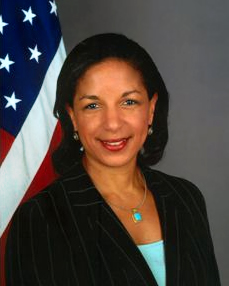 Liberals nationwide, and here in Colorado, have been slamming critics of UN Ambassador Susan Rice as “bullies” and claiming it’s stupid politically to oppose her nomination to Secretary of State because she is black and a woman, as former Denver Post liberal columnist Mike Littwin tweeted recently.
Liberals nationwide, and here in Colorado, have been slamming critics of UN Ambassador Susan Rice as “bullies” and claiming it’s stupid politically to oppose her nomination to Secretary of State because she is black and a woman, as former Denver Post liberal columnist Mike Littwin tweeted recently.
Invoking the race card is a tired old tactic of the left, but this time around the very content-based criticisms of Rice are overwhelming the hysterical cries of racism.
From The New York Times‘ left-wing feminist Mauren Dowd:
When Rice asked to come to the Hill to meet with some of her Republican critics, it seemed détente was nigh. But somehow the hour-and-a-half powwow caused an escalation, with McCain, Graham and Senator Kelly Ayotte of New Hampshire emerging to say they had more reservations than before. Senator Bob Corker of Tennessee, who’s scheduled to meet with Rice on Wednesday, suggested that she would be better suited to run the Democratic National Committee than State. If Rice can’t soothe the egos of some cranky G.O.P. pols, how would she negotiate with China? (Peak emphasis)
Dowd goes on to note that moderate GOP Senator Susan Collins, who introduced Rice to the Senate Foreign Relations Committee during her nomination as UN Ambassador, also has serious reservations about Rice due to her taking her Ambassador title and engaging in political hackery on behalf of Obama in the heat of the campaign.
And that’s a key part of the problem. Beyond Rice’s incompetence and misleading of the American people on Benghazi, is her reputation as a political hack, rather than a statesman, which is what the Secretary of State’s role is designed to be.
Rice was exposed as the most craven of political hacks in a damning 2001 Atlantic Monthly article by none other than Obama political appointee Samantha Power, who reported that during the Rwandan genocide in 1994, Rice was concerning herself with the effect calling the slaughter of nearly a million Tutsis “genocide” might have on midterm elections:
At an interagency teleconference in late April, Susan Rice, a rising star on the NSC who worked under Richard Clarke, stunned a few of the officials present when she asked, “If we use the word ‘genocide’ and are seen as doing nothing, what will be the effect on the November [congressional] election?” Lieutenant Colonel Tony Marley remembers the incredulity of his colleagues at the State Department. “We could believe that people would wonder that,” he says, “but not that they would actually voice it.” Rice does not recall the incident but concedes, “If I said it, it was completely inappropriate, as well as irrelevant.”
Rice’s misleading of the American people on Benghazi was a symptom of a much larger issue. She is a political hack, more concerned with domestic politics than international diplomacy.
Opposing Susan Rice as Secretary of State has all of nothing to do with her gender and race, and everything to do with the content of her character.
